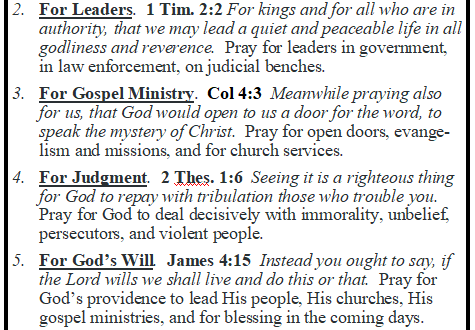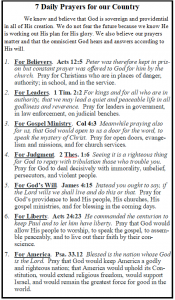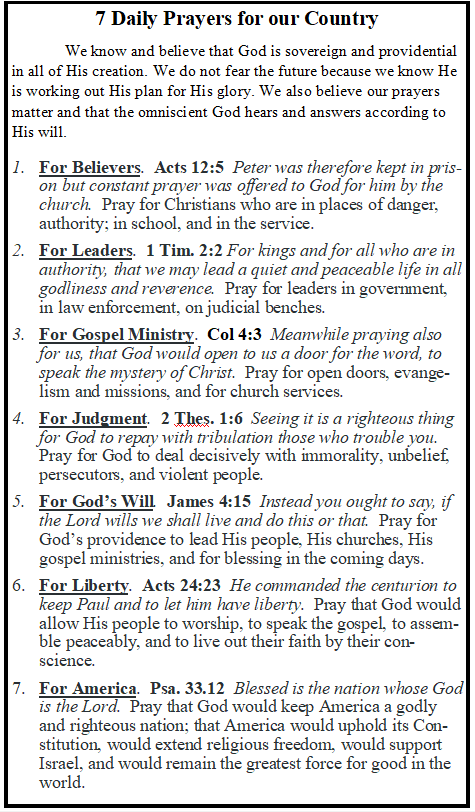We end our series about walking with God where it should end, considering the time of our death. I don’t know why the topic should seem morbid to us, all of us will die and the only thing that can change that is the rapture of the church at the end of the age. That is my first hope but the last thing I plan for. We all have to live our lives like Paul, “That I might finish my course with joy, and the ministry which I have received of the Lord Jesus” (Acts 20:24).
It’s the fall of the year and God’s beauty and handiwork are on display all around. Just as the year will cycle through its four seasons as God has commanded, so our life will cycle through its seasons. I like that our house faces West so that in the morning I can sit on the back porch and look east at the sunrise with all of its splendor. Spring and Summer offer good weather and sitting out is easy and comfortable. But from my vantage the leaves on the trees east of our back yard block much of the view “when the morning guilds the sky.” Now the leaves are falling and winter is coming quickly. It is colder and more uncomfortable to sit outside yet soon the Eastern sky will be unblocked and the sunrise more glorious because the leaves are fallen. I have found the seasons of life to be the same. In my youth there were many necessary cares that blocked the view of the skies, but now in the Fall and coming Winter of my life I am anticipating and already enjoying the clearer view.
I have found that most older believers don’t fret or regret the younger years nor do they begrudge the youth theirs. They know that “though the outward man perish, yet the inward man is renewed day by day” (2 Cor. 4:16). Most older believers enter these years, the most physically challenging of their lives, with courage, joy, humor, and strength. For most of us, our mentors are gone on ahead and the hand that used to pull us forward is not there. We are still pulling on the hands behind us, but our eyes are ahead of us and our growing joy awaits us.
I think I speak for many when I say that I want to walk with God to the very finish line, to “press toward the mark” (Phil. 3:14) and hear a glad “well done.” In my wonderful years at Bethel Baptist Church in Ft. Collins, CO, Twila had been the only secretary of the church since its beginning in 1958. She had that job for forty years until she retired. But sadly, the same year she retired she was found with cancer that quickly took her life. I’ll always remember when she looked at me from her bed and said, “I want to do this well.” I can confidently say that most senior saints desire to do the same.
It has been my privilege to perform well over a hundred funerals throughout my ministry. I’m sure that in heaven we’ll both laugh and rejoice at the funerals we attended and maybe even at our own. But more than anything else, and much should be said at a loved one’s passing, funerals teach us the reality of life both now and forever. “The heart of the wise is in the house of mourning but the heart of fools is in the house of mirth” (Ecc. 7:4). I have seen more lost people face the reality of death and judgment at funerals than anywhere I have preached the gospel. It is a great testimony when positive words about faith and heaven can be given at the end of one’s Christian life.
Of course, no one can speak of death first hand but having been around it a lot, here are a few ways in which I have witnessed that we can walk with God in the closing years of our lives.
Know the inevitability of death
We know that God has said it is appointed unto us “to die” (Heb. 9:27). This was promised to Adam and Eve when they sinned and it was passed on (as was their sin) to all of their posterity. Every cemetery bears witness to that fact. Psalm 90 is the only psalm with Moses’ name on it and it is a psalm about death. He saw a lot of it in the last forty years of his life. “The days of our years are threescore years and ten; and if by reason of strength they be fourscore years, yet is their strength labor and sorrow; for it is soon cut off and we fly away.” But Moses didn’t end there. He also said, “So teach us to number our days that we may apply our hearts unto wisdom” (Psa. 90:10, 12). Death is the last debt we owe to sin and we must pay it, but let us do it with Christian strength and conviction.
C.S. Lewis wrote a lot during the war years and encouraged his fellow Brits to stay positive. He wrote, “But there is no question of death or life for any of us, only a question of this death or of that—of a machine gun bullet now or a cancer forty years later. What does war do to death? It certainly does not make it more frequent; 100 percent of us die, and the percentage cannot be changed.”1 There are times when death seems more frequent but it is not. “There is a democracy about death. It comes equally to us all, and makes us all equal when it comes.”2
It is a sad thing to perform a funeral for a lost person. There is no hope nor comfort of the Spirit. Death is accepted by all but with fear and not with joy. How different for the believer and family! “We sorrow not even as others which have no hope” (1 Thes. 4:13).
Overcome the fear of death
Inevitability ought not to produce fear. God has made provision for His saints. The resurrected Jesus said, “I am he that liveth, and was dead; and, behold, I am alive forevermore, Amen; and have the keys of hell and of death” (Rev. 1:18). Jesus became a man and died for us, “that through death he might destroy him that had the power of death, that is, the devil; and deliver them who through the fear of death were all their lifetime subject to bondage” (Heb. 2:14-15).
Augustine said, “For sooner or later every man must die, and we groan, and pray, and travail in pain, and cry to God, that we may die a little later. How much more ought we to cry to him that we may come to that place where we shall never die.”3 In our beloved current church, Charlie was a great Christian man who died of cancer. On his deathbed while Mary his wife sat beside him, he asked, “Honey, how does a man die?” She said, “Well, I guess you just ask God to take you.” Charlie folded his hands over his chest, said a silent prayer, and went to sleep. Charlie woke up but not on this side of glory but the other. How confident the believer can be at the time of death. As Watts wrote, “When I can read my title clear to mansions in the skies, I’ll bit farewell to every fear and wipe my weeping eyes.”
Know God walks the valley with you
“Yea, though I walk through the valley of the shadow of death, I will fear no evil: for thou art with me” (Psalm 23:4). Notice the truths in this verse. “Though.” It is not an if or a maybe but a certainty. “I walk.” We can’t run or stop but must walk at the normal speed. God will determine the end, not us. “Through.” It is a valley with an open end, not a boxed canyon. “Weeping may endure for a night, but joy cometh in the morning” (Psa. 30:5). “The valley.” It is narrow and confining and our perspective is small. It is not a joy to be in the valley but it is a valley with a mountain on both sides. “Of the shadow.” A shadow is not the real thing. The mountain that casts the shadow is heaven itself. “Of death.” Jesus said, “I am the resurrection and the life; he that believeth in me, though he were dead, yet shall he live” (John 11:25). “I will fear no evil for thou art with me.” When God walks with you through this valley, fear and doubt melt away.
Philip Doddridge wrote, “I acknowledge, O Lord, the justice of that sentence by which I am expiring; and own thy wisdom and goodness in appointing my journey through this gloomy vale which is now before me. Help me to turn it into the happy occasion of honoring thee, and adorning my profession! And I will bless the pangs by which thou art glorified, and this mortal and sinful part of my nature dissolved. . . let me close the scene nobly.”4
Stay positive and productive
Saying with Paul that we will press toward the mark at the end of our lives is easier said than done. If we are not diligent in the later years we will become what we don’t want to be, negative, sour, and critical. It’s not the gray hair or the aging body that makes a senior unattractive, it is the letting down of the guard when we need it most.
I ran some track when I was in high school. I was never very good but for some reason the coach made me run the hardest race of all—the quarter mile. That is one full circle around the track. I say the hardest because you basically have to run full speed for about as long as you can before you collapse. You start out well, running with energy and strength, but when you come around that last turn and head for the finish line, as they say, the old bear climbs on your back. You can see the finish but you don’t think you can make it there. Somehow you have to keep pushing until you cross the line. And you would like to be the first one!
“Let us lay aside every weight, and the sin that doth so easily beset us, and let us run with patience the race that is set before us” (Heb. 12:1). The writer of Hebrews also told us that Jesus is the Author and the Finisher of our faith (12:2). He is the starting line and the finishing line. In the quarter mile, the starting line is also the finishing line. If we keep our eyes on Him as we come around the last turn, we’ll have the strength to make it all the way to the right pace. Spurgeon said, “O Lord, let them not die without hope, and may thy believing people learn to pass away without even tasting the bitterness of death. May they enter into rest, each one walking in his own uprightness.”5
Face physical challenges well
As we come closer to the end of our days we naturally have more and more physical challenges. The outward man is perishing though the inward man is being renewed day by day. That is, it’s not that the soul leaves the body as much as the body deserts the soul! The soul cannot be “absent from the body” (2 Cor. 5:8) until the body “returns to dust” (Ecc. 12:7) and the soul can “fly away” (Psa. 90:10). This is why the soul is “willing rather to be absent from the body, and to be present with the Lord” (2 Cor. 5:8) but cannot go until the body finally quits.
And the body is dying! “It is sown in corruption . . . In dishonor . . . It is sown a natural body” (1 Cor. 15:42-44). The seed has to be put into the ground and die for resurrection to take place. This is not necessarily bad. William Law wrote, “The greatness of those things which follow death makes all that goes before it sink into nothing.”6
I remember reading about Vance Havner speaking to college students when he was in his later years. After he described the busy schedule that he was still keeping, a student said, “If I did all of that I would die,” to which Havner replied, “who said you can’t die?” Paul said, why do you weep and break my heart, “for I am ready not to be bound only, but also to die at Jerusalem for the name of the Lord Jesus” (Acts 21:13. That is the Christian spirit when facing the challenges of the difficult years.
Leave a legacy after death
“Blessed are the dead which die in the Lord from henceforth: Yea, saith the Spirit, that they may rest from their labors and their works do follow them” (Rev. 14:13). As I grow older and look back over my life and then forward to the time I have left, I realize that most of what I will do in the future depends on what I have done in the past. First my children and grandchildren, then all of those whom I have had the privilege of pastoring, these all will spread out the influence I will have in this world after I am gone. I trust that more will be done by these than I have ever done in my short life.
This makes me adjust my priority as I get closer to finishing my course. They will do the work, not I. They will multiply the work and extend it far beyond the time I have. Their work will be theirs but it will also be mine, just as my work is mine but also my predecessors. One plants, another waters, but God gives the increase. Paul put it this way, “Likewise also the good works of some are manifest beforehand; and they that are otherwise cannot be hid” (1 Tim. 5:25). An old woodsman’s saying is, a tree is best measured when it is cut down.
Doddridge also said, “Well then, let me beseech you to learn how you should live, by reflecting how you would die, and what course you would wish to look back upon, when you are just quitting this world, and entering upon another.”7 Unfortunately I cannot go back and change something that was not the best. I can only reconcile it with God and explain it to those I love. Someone asks, “will your children live out what you have taught them?” I can only answer by seeing how they are raising their own children. “As arrows in the hand of a mighty man; so are children of the youth. Happy is the man that hath his quiver full of them: they shall not be ashamed, but they shall speak with the enemies in the gate” (Psa. 127:4-5). And as John wrote, “I have no greater joy than to hear that my children walk in truth” (3 John 4).
Look forward to life after death
The most encouraging thing I have read lately is old Richard Baxter’s, The Saints’ Everlasting Rest. It is a treasure of encouragement for the believer to look forward, not backward, at the end of his or her life. He wrote, “I am going to the place that I daily conversed in; to the place from whence I tasted such frequent delights; to that God whom I have met in my meditations so often. My heart hath been in heaven before now, and hath often tasted its reviving sweetness; and if my eyes were so enlightened and my spirits so refreshed when I had but a taste, what will it be when I shall feed on it freely.”8
How often we have preached on and studied about heaven? How often have we, in our prophetic studies, contemplated the millennial joys that we will receive for a thousand years on this earth? How often have we studied Revelation 21 and 22 and wondered about the New Jerusalem our eternal home? And how often have we studied both the earthly life and the heavenly life of our Lord Jesus Christ and have testified of our longing to see Him? Well, those times are coming, and soon! Why should we try so hard to prevent it? We should rather rejoice that our salvation is nearer than when we believed.
Paul said it best in the last chapter of his last epistle while waiting for martyrdom. “For I am now ready to be offered, and the time of my departure is at hand. I have fought a good fight, I have finished my course, I have kept the faith: Henceforth there is laid up for me a crown of righteousness, which the Lord, the righteous judge, shall give me at that day: and not to me only, but unto all them also that love his appearing” (2 Tim. 4:6-8). And Peter said that we have been born again “unto a lively hope by the resurrection of Jesus Christ from the dead, to an inheritance incorruptible, and undefiled, and that fadeth not away, reserved in heaven for you who are kept by the power of God unto salvation ready to be revealed in the last time. Wherein ye greatly rejoice.” (1 Pet. 1:4-5)
And so . . .
We can certainly walk with God in time of death. In fact, this is the time of our greatest faith and our greatest witness. I have heard many saints of God on their deathbed say, “I am so ready to go.” I have stood over many caskets and heard people say, “He is better off now. The pain and suffering is over, he is happier than we are.” Well, do we really believe those things? I know we do and I encourage all of us to practice it ourselves.
I would be amiss if I did not end this article, and also this series, with an encouragement to know Christ. Perhaps you have read this looking for hope at the end of your life. Look to Jesus, the One Who loved you and gave Himself for you. He will save you from your sins and give you eternal life in heaven. Ask Him to be your Savior today. Then you will say with Simeon when he saw the baby Jesus, “Now let they servant depart in peace . . . For my eyes have seen thy Salvation” (Lk. 2:29-30).
Notes:
- C.S. Lewis, The Weight of Glory (New York: MacMillan, 1980) 31.
- John Donne, quoted in Just As I Am (San Francisco: HarperCollins, 1997) 464.
- Augustine, “Discourse on the Lord’s Prayer,” Orations (New York: Collier, 1902) 1189.
- Philip Doddridge, The Rise and Progress of Religion in the Soul (U. of MI. reprint, nd) 319.
- C.H. Spurgeon, Spurgeon’s Prayers (UK: Christian Focus, 2002) 114.
- William Law, A Serious Call to a Devout and Holy Life (Phil: Westminster Press, 1948) 28.
- Doddridge, 207.
- Richard Baxter, The Saints’ Everlasting Rest (Boston: American Tract Soc., nd) 318.










